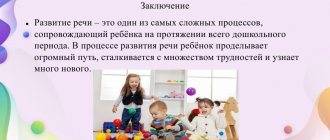Speech problems in children
Speech disorders in children can be caused by the following reasons.
Phonetic underdevelopment
Perhaps the most common type of violation is the incorrect pronunciation of one or more sounds. Before a speech therapist, you can visit an orthodontist - sometimes the problem can be solved by cutting the frenulum.
Phonetic-phonemic underdevelopment
With such a violation, the baby cannot even hear the sound correctly. Difficulties arise with speech, writing, and learning languages. Ask your child to repeat after you the chains of words: “dom-som-kom-lom” or syllables: “gu-ku-gu-ku.” If he makes a mistake, this is a warning sign.
General underdevelopment
Poor vocabulary, difficulty expressing thoughts, inability to write a description of a picture... As a rule, such children begin to speak later than their peers. They find it difficult to concentrate and remember. In addition to a speech therapist, you will most likely need a neurologist.
Pathologies associated with injuries, heart defects, damage to the nervous system
Examples of such pathologies include alalia, aphasia and dysarthria.
Alalia occurs due to damage to the nervous system. The child speaks very poorly, and his speech is meaningless, or he does not speak at all. Also, sometimes a baby may suffer from movement disorders, hyperactivity, or, conversely, retardation.
If alalia implies that speech initially develops incorrectly or does not develop, then aphasia is an acquired disorder. It can be caused by damage to the cerebral cortex, head injuries, and heart defects. With aphasia, children do not understand other people's speech and do not control their own, do not remember words well, and change sounds and syllables.
Dysarthria is a relatively rare disorder in which a person's speech is slurred and slurred. Dysarthria is provoked by disturbances in speech breathing and articulation, which are associated with lesions of the nervous system.
Such problems need to be dealt with comprehensively - with the help of neurologists, teachers, psychologists and speech therapists.
How to create an activity at home?
The main principles of homework:
- Regularity. Exercise every day, but without overloading the baby and taking into account his age and well-being. You can start with 3-5 minutes a day, gradually increasing to 15-25.
- Game form. Only you know what your child will like most: retelling an interesting story or a competition to see who can pronounce a tongue twister the fastest. Start with tasks that are more interesting to your baby, gradually moving on to less exciting ones.
- Comfortable environment. For many types of activities you need, at a minimum, a table, a comfortable chair, and often a mirror on a stand.
- Patience. It is impossible to achieve amazing results in one mini-lesson. Encourage your child, praise him for successes and don’t get angry for mistakes, don’t laugh or imitate. Otherwise, the baby will withdraw into himself, and speech problems may worsen.
- Do not do tasks for your child if he cannot cope with them. The point of the classes is to benefit the baby, and not to impress the speech therapist.
Pronunciation of complex sounds
Articulation develops gradually; children usually master the pronunciation of complex sounds last. Often in speech the child replaces them with simpler ones or does not pronounce them at all.
Sound "R"
Experts advise studying this difficult sound in a child at the age of 5. If the baby pronounces “r”, but incorrectly, then even earlier - then it’s more difficult to relearn.
To help:
- Tongue twisters with “r” (“Karl stole corals from Clara, and Clara stole Karl’s clarinet.”
- Imitation (just say “r” in your speech in front of the child as clearly and cleanly as possible).
- Production from other sounds that the child pronounces correctly. For example, when a child pronounces “zh”, carefully move the tongue deeper into the mouth with a stick - a “r” is formed. Strengthen the sound by repeating the exercise several times. Or the baby says “z”, lightly touching the alveoli with his tongue, and blows heavily on the tongue. The sound "r" is heard.
- Three-stage exercise: the tongue is “sucked” to the hard palate, the child takes a deep breath through the nose and a short exhale through the mouth, connecting the voice.
- Setting up mechanically (carried out only by a speech therapist - with a hammer, spatula).
Sound "Sh"
The production of this sound occurs at 3–5 years of age.
The most commonly used way is through “s”. The child raises his tongue to the sky, pronounces “s” and smoothly exhales air to make “sh”. Before directly placing the “w,” experts recommend developing articulation of the lips and tongue with the help of exercises:
- A wide smile, exposing both rows of teeth, for 5-7 seconds.
- Licking lips with a “wide tongue” from top to bottom.
- Curling the wide tip of the tongue towards the nose.
- The child stretches out his lips with a straw and blows on a cotton ball for a long time, pushing it, for example, into the corner of the table.
- The baby blows through his closed lips onto a strip of paper - stronger, weaker, stronger again.
How do you know when it’s time to work on your child’s speech?
Initially, the child learns to pronounce sounds, then to put them into words, then to construct phrases and express thoughts. You should not expect from a two-year-old child impeccably clean pronunciation and beautiful speech, observing genders and cases. In addition, until the age of three, a child will not be able to concentrate on classes for more than 10 minutes.
The optimal age for starting classes for a healthy child is four to five years. By six he should already be able to pronounce sounds correctly and express his thoughts coherently. It is better to correct the pronunciation before the molars grow in.
Classes are needed if:
- the baby pronounces individual sounds incorrectly;
- the child rearranges syllables in words, constructs phrases incorrectly, confuses cases, gender, and numbers;
- “porridge in the mouth”;
- speech is too fast, slurred;
- the child stutters;
- the baby has suffered a birth injury or infectious disease;
- The child was diagnosed with hearing impairment, mild mental retardation, and developmental delay.
Even if you are not going to take your child to a speech therapist on an ongoing basis, it is worth bringing him for a consultation - you will receive recommendations for home activities. It is also advised to show the child to a speech therapist before school, even if there are no obvious problems.
The problem of speech disorders is not always purely speech therapy - sometimes it makes sense to correct pronunciation only after treatment.





